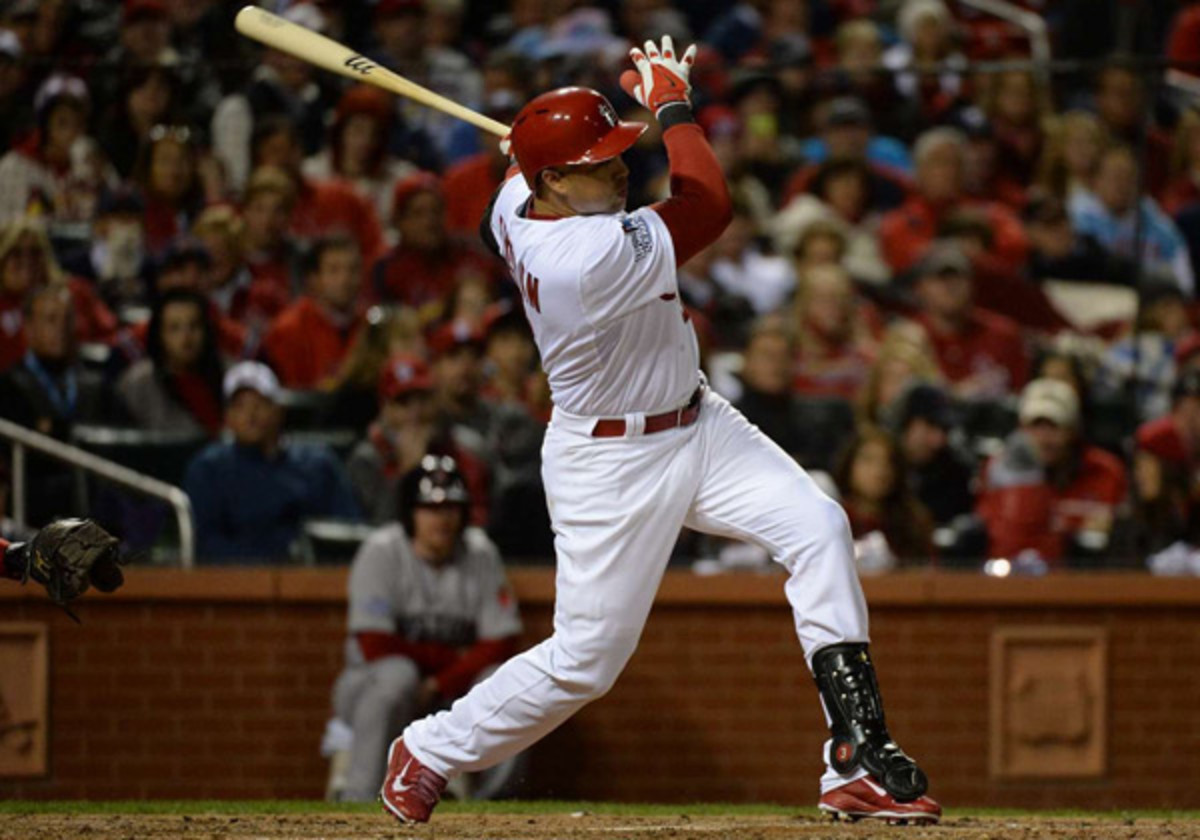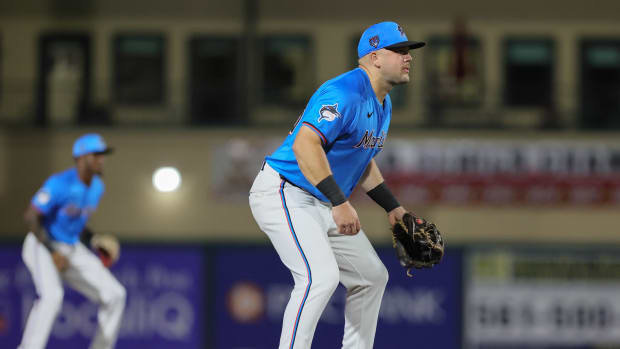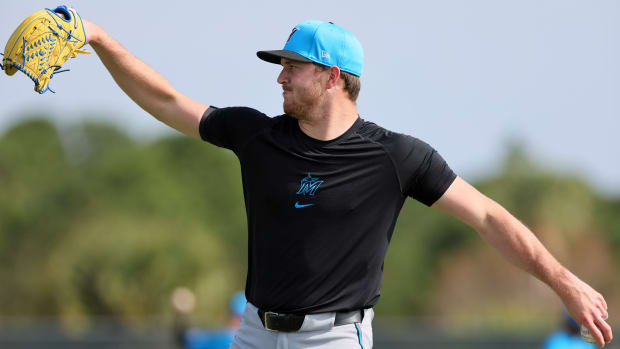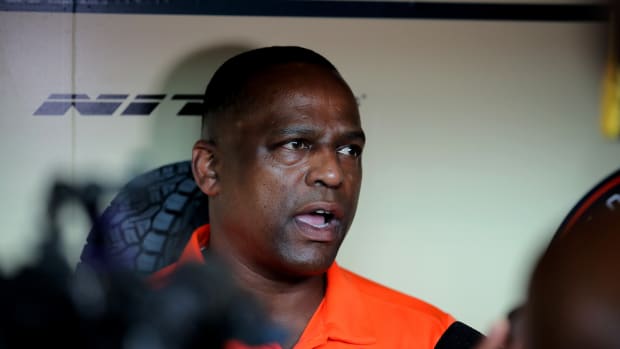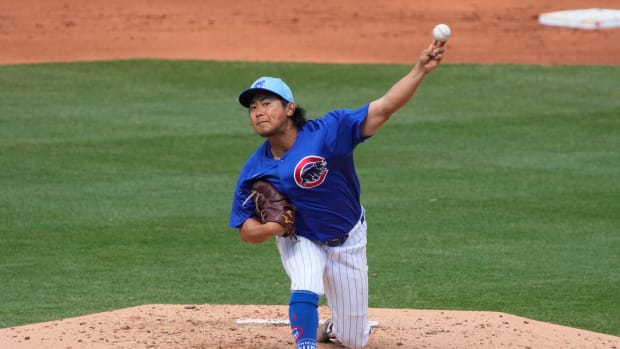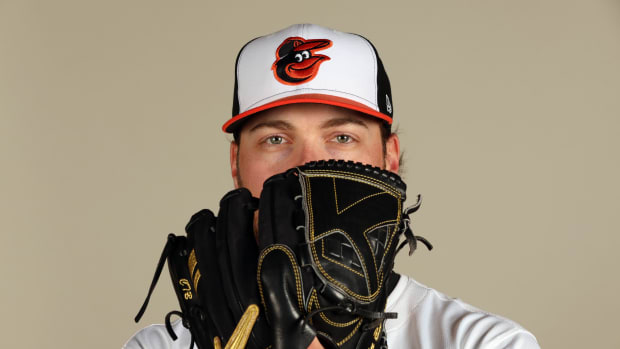Carlos Beltran a nice addition, but he won't solve the Yankees' problems
Carlos Beltran and the Yankees agreed to a three-year, $45 million deal. (David E. Klutho/SI)
In what has been an unbelievably busy week of Hot Stove action, no team has been busier than the New York Yankees.
After coming to terms with Carlos Beltran on a three-year contract worth $45 million Friday night, the Yanks have committed $217 million over 12 player seasons to four free agents (Beltran, Jacoby Ellsbury, Hiroku Kuroda, and Kelly Johnson, the first three with a combined average annual value of $19.5 million). New York has also lost two other free agents to a pair of contracts worth a combined $300 million (Robinson Cano and Curtis Granderson), non-tendered three players, and executed a minor trade that sent their starting catcher from this past season, Chris Stewart, to the Pirates, all over the course of five business days.
Coming as it does in the immediate wake of the Cano and Granderson departures, the Beltran signing can't help but appear to be a reaction to those losses. The Yankees, however, have been targeting Beltran all along, and it's not hard to see why. Though he will be 37 in April and 39 in the final year of his new contract, Beltran has experienced a second life in the wake of the knee injuries that briefly derailed his career in 2009 and 2010. In the three seasons since, Beltran has hit .288/.356/.503 while averaging 26 homers, 88 RBIs and 146 games played despite playing for three teams — the Mets, Giants and Cardinals — all of which play in pitchers' parks in the National League, where giving Beltran's old legs a rest via a start at designated hitter was an infrequent luxury.
Indeed, Beltran made just nine regular season starts at DH over those three seasons, but he is likely to find himself at the position more often in his return to the American League ten years after the Royals traded him to the Astros.
With the additions this week of Ellsbury and Beltran, the Yankees, despite the departure of Granderson, have a well-populated outfield. Ellsbury is an All-Star center fielder. Incumbent center fielder Brett Gardner, one of the best defensive outfielders in the game as well as a top-of-the-order speedster with solid on-base numbers, will be pushed to left field. Beltran, another former center fielder, will be the primary right fielder, though he and the soon-to-be-38-year-old Alfonso Soriano, who are of roughly equal value in the field at this point in their careers, are likely to toggle between right and DH. Given the injury histories of Ellsbury and Gardner, they could also often occupy both corners, opening designated hitter for members of the Yankees' aging infield.
The move to the DH league and a hitter-friendly park is a smart one for Beltran, though this is surely his last multi-year contract. It should benefit the Yankees in a similar fashion, if not by increasing Beltran's productivity then by softening his likely decline as he continues into his late 30s. At the same time, signing Beltran now is a bitter pill for Yankee fans given that nine years ago he was, according to Tom Verducci and Joe Torre's The Yankee Years, "willing to take a 20 percent discount" to sign with the Yankees and succeed fellow Puerto Rican Bernie Williams in center field. Instead, the Yankees signed Carl Pavano, Jaret Wright and, at George Steinbrenner's behest, traded for Randy Johnson while Beltran went on to pad his Hall of Fame credentials with the crosstown Mets.
Nonetheless, Beltran makes the Yankees considerably better even after all of these years, and returns to New York having stoked his reputation as one of the game's great postseason hitters having hit .306/.410/.571 in 118 postseason at-bats for the Cardinals over the last two Octobers. The Yankees, however, are no longer a lock to play in October on an annual basis.
As strong and deep as their outfield now is (the Beltran signing pushes Ichiro Suzuki to the bench and Vernon Wells that much closer to what seems like his inevitable release), and despite the addition two weeks ago of All-Star catcher Brian McCann, the Yankees infield is a potential disaster. Cano is now a Mariner. Alex Rodriguez still faces a major suspension. Derek Jeter is coming off a twice-broken ankle that never fully healed and, along with other leg injuries, limited him to 17 games last year. And Mark Teixeira is coming off a twice torn tendon sheath in his right wrist that similarly limited him to 15 games last year following a steady decline in production in his early 30s. In other words, the Yankees have very little to bank on in the infield.
VERDUCCI: Mariners got Cano by showing him the money Yankees wouldn't
Even if they are able to play in the coming season, Jeter will be 40 in June, Rodriguez, who has been limited to an average of 88 games played over the last three seasons due to injury, will be 39 in July, and Teixeira will be 34 in April. Kelly Johnson, who currently stands as the team's projected second baseman, has hit .226/.307/.395 over the last three years despite playing in hitter-friendly ballparks in Arizona and Toronto in two of those three seasons, while the primary backups either can't hit (Brendan Ryan: .217/.283/.294 over the last four seasons) or can't field (Eduardo Nuñez, who was 2. 3 wins below replacement in the field in 2013).
Then there's the Yankees' goal of staying under the $189 million competitive balance tax threshold for the coming season in order to reset their tax rate. Based on the average annual values of their contracts, which is how they are measured when assessing the tax, Ellsbury, McCann, Beltran, Kuroda, Johnson, and Ryan have increased the Yankees' 2014 payroll by $75.36 million, putting their estimated 2014 payroll at $171.66 million, a figure which doesn't include the salaries of arbitration eligible players such as Gardner, David Robertson, and Ivan Nova, or of the pre-arbitration players who will fill out the roster, who should eat up the remaining $17.34 million.
A full-season suspension for Rodriguez would clear roughly $27.5 million in additional cap room with which the Yankees could sign a replacement for Rodriguez and possibly make some necessary upgrades on the pitching staff, particularly in the bullpen. However, with teams so active this offseason, the Yankees' options in such areas are dwindling quickly while they wait for the arbitrator's verdict on Rodriguez, which isn't due until January 15, though it could come earlier that month. What's more, Rodriguez is hoping to continue his case against baseball in federal court thereafter, which could result in his suspension being further delayed via an injunction.






























